高中英语倒装句讲解以及习题只是分享
高中英语倒装句等特殊句式讲义以及练习题(高考总复习,纯干货,原创)

第一个我们来学习倒装句,倒装属于单选常考的知识点,而且也是写作中的较高级句式了。
一、倒装:完全倒装、部分倒装、形式倒装(假倒装)***倒装句口诀:地点全倒装,son也虚假关于完全倒装“地点全倒装”的意思是:句子中将表示地点、时间等方位位置或者时间的副词、介词等词提前时,句子要全部倒装。
全部倒装的句式结构:地点+谓语+主语。
1.表示地点方位位置的副词、介词,运动方位的副词(under,there,here,out,in,up,down,away,near,opposite……)、时间的副词(now,then)位于句首时, 句子要全部倒装。
A girl sits under the tree倒装后变为Under the tree sits a girl.注意完全倒装中,代词做主语不倒装.如果说这句话是代词做主语:She sits under the tree.那么即使是将描述地点的介词提前,这句话也不倒装,而是变为Under the tree she sits.练习题(1)A bus comes here.= _______________________________________________________ 练习题(2)Your turn comes now.= ____________________________________________________Here/there句型用一般现在时,代词做主语不倒装;Here you are. Here it is.关于部分倒装口诀的下半句中“S on也虚”对应部分倒装,我们来看一下部分倒装的结构。
部分倒装的句式结构:就是将部分倒装标志词提前以后,句子变为一般疑问句语序。
即:标志词+助动词/be动词/情态动词+主语+其他……S:So/such……that……(注意:“主倒从不倒”,也就是说是so/such所在的主句倒装,that后的从句不用倒),看例句:He speaks English so clearly that he can always make himself understood.=so是标志词,所以so clearly这个意群提前(举个例子来说意群:一辆出租车来了=来了一辆出租车,其中“一辆出租车”这几个字不能拆分,它就是一个意群),然后再将主句调整为上边说的部分倒装句式结构。
高中英语语法倒装句讲解及练习(附答案)教学文案
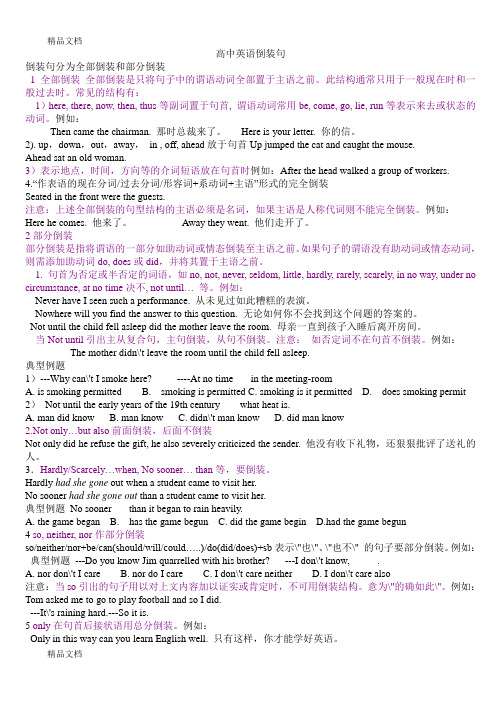
高中英语倒装句倒装句分为全部倒装和部分倒装1全部倒装全部倒装是只将句子中的谓语动词全部置于主语之前。
此结构通常只用于一般现在时和一般过去时。
常见的结构有:1)here, there, now, then, thus等副词置于句首, 谓语动词常用be, come, go, lie, run等表示来去或状态的动词。
例如:Then came the chairman. 那时总裁来了。
Here is your letter. 你的信。
2). up,down,out,away,in , off, ahead放于句首Up jumped the cat and caught the mouse.Ahead sat an old woman.3)表示地点,时间,方向等的介词短语放在句首时例如:After the head walked a group of workers.4.“作表语的现在分词/过去分词/形容词+系动词+主语”形式的完全倒装Seated in the front were the guests.注意:上述全部倒装的句型结构的主语必须是名词,如果主语是人称代词则不能完全倒装。
例如:Here he comes. 他来了。
Away they went. 他们走开了。
2部分倒装部分倒装是指将谓语的一部分如助动词或情态倒装至主语之前。
如果句子的谓语没有助动词或情态动词,则需添加助动词do, does或did,并将其置于主语之前。
1. 句首为否定或半否定的词语,如no, not, never, seldom, little, hardly, rarely, scarely, in no way, under no circumstance, at no time决不, not until… 等。
例如:Never have I seen such a performance. 从未见过如此糟糕的表演。
Nowhere will you find the answer to this question. 无论如何你不会找到这个问题的答案的。
高中英语语法倒装句讲解及练习(附答案)

高中英语倒装句倒装句分为全部倒装和部分倒装1 全部倒装全部倒装是只将句子中的谓语动词全部置于主语之前。
此结构通常只用于一般现在时和一般过去时。
常见的结构有:1)here, there, now, then, thus等副词置于句首 , 谓语动词常用 be, come, go, lie, run等表示来去或状态的动词。
例如:Then came the chairman. 那时总裁来了。
Here is your letter. 你的信。
2). up,down,out,away, in , off, ahead 放于句首 Up jumped the cat and caught the mouse.Ahead sat an old woman.3)表示地点,时间,方向等的介词短语放在句首时例如:After the head walked a group of workers.4.“作表语的现在分词 /过去分词 /形容词 +系动词 +主语”形式的完全倒装Seated in the front were the guests.注意:上述全部倒装的句型结构的主语必须是名词,如果主语是人称代词则不能完全倒装。
例如:Here he comes. 他来了。
Away they went. 他们走开了。
2 部分倒装部分倒装是指将谓语的一部分如助动词或情态倒装至主语之前。
如果句子的谓语没有助动词或情态动词,则需添加助动词 do, does或 did,并将其置于主语之前。
1. 句首为否定或半否定的词语,如 no, not, never, seldom, little, hardly, rarely, scarely, in no way, under no circumstance, at no time决不 , not until 等⋯。
例如:Never have I seen such a performance从.未见过如此糟糕的表演。
必备英语倒装句技巧全解及练习题(含答案)及解析

必备英语倒装句技巧全解及练习题(含答案)及解析一、倒装句1.— I have never visited a paper factory.— .A. So have IB. I haven't nowC. Neither have I【答案】 C【解析】【分析】句意:-我从来没有参观过造纸厂。
-我也没去过。
根据句意可知这里表示的是否定的意思,故A可以先排除,因为so 的这个倒装的用法只能用在肯定句中,表示上面所说的情况也适用于另外一人。
在否定句应该用neither,当neither 位于句首时,应该用倒装的结构。
故选C。
【点评】考查倒装。
2.—Oh, my god! Recently I have put on 5 pounds.— . I think I should lose weight.A. So do IB. So have IC. Neither do ID. Neither have I【答案】 B【解析】【分析】句意:—啊,我的天呀!最近我长胖了五磅。
—我也是,我认为我应该减减肥了。
so +主语+助动词/情态动词/系动词:某某确实如此,主语与上文是同一人。
So+助动词/情态动词/系动词+主语:某某也如此,主语与上文不是同一人,表示后者适合前者。
上文是否定句,下文表示某某也不,用 neither +助动词+主语。
这些句式在时态上与前一个句子相同。
根据上句是肯定句,现在完成时态,主语与上句不同,故选B。
【点评】考查固定结构,牢记并熟练运用此结构,能举一反三,应对自如。
3.—We are not allowed to bring any snacks or drinks at the school meeting.— .A. Neither are weB. Neither do weC. So are weD. So do we【答案】 A【解析】【分析】句意:—我们在学校会议上不被允许带任何零食和饮料。
倒装句讲解与练习(高中带答案解析)
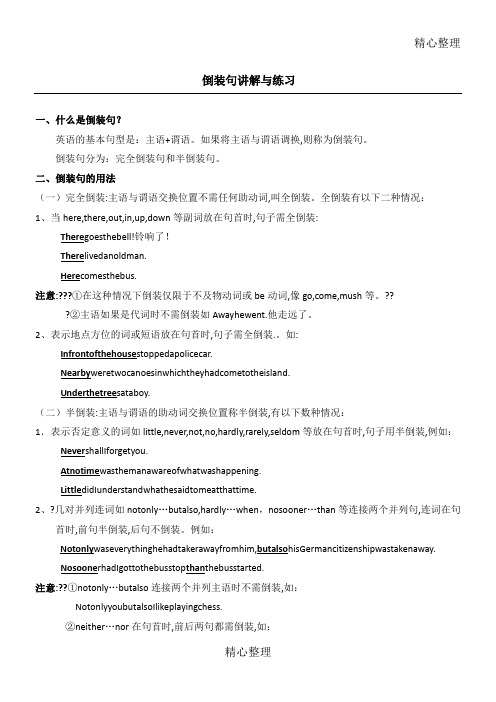
精心整理倒装句讲解与练习一、什么是倒装句?英语的基本句型是:主语+谓语。
如果将主语与谓语调换,则称为倒装句。
倒装句分为:完全倒装句和半倒装句。
二、倒装句的用法1注意212、?时,前句半倒装,后句不倒装。
例如:Notonly waseverythinghehadtakerawayfromhim,butalso hisGermancitizenshipwastakenaway.Nosoone rhadIgottothebusstop than thebusstarted.注意:??①notonly…butalso连接两个并列主语时不需倒装,如:NotonlyyoubutalsoIlikeplayingchess.②neither…nor在句首时,前后两句都需倒装,如:Neither doIhaveasister nor doesmyhusband.3、only放在句首强调状语时,主句用半倒装。
例如:Onlythen didIrealizethatIwaswrong.Onlyinthisway canIlearnfrommyfault.Onlywhenthewarwasoverin1918washeabletogetbacktowork.注意:only强调主语不倒装:如Onlytheteacherscanusetheroom.4、so…that句型,so放在句首时,主句用倒装结构,that从句不用倒装。
例如:5.倒装句练习题1.HismotherhadtalkedtohimformanyminuteswhilehewaswatchingTV,but____.A.alittledidhehear??B.littledidhehear??C.littleheardhe??D.alittleheardhe2.——Hello,ZhuHua.I’llhavetoreturntoCanadabecauseI’veworkedhereforayear. ——_____!A.Whattimeflies??B.Howtimeflies??C.Whatdoestimefly??D.Howdoestimefly3.Duringthewar,____butalsohelosthiswifeandhischild.4.6.10.——Whatsportdoyoulikebest?——Springboarddiving(跳板跳水).___todiveintowaterfromhighboard!A.Whatafunisit??B.Howfunitis??C.Howafunisit??D.Whatfunitis11.——Theoldmanwouldn’tstayathomeforarestevenifitrained.——____.Hewouldfeelsickifhestayedhomeforoneday.A.Sowouldmygrandpa???B.Sowouldn’tmygrandpaC.Neitherwouldmygrandpa??????D.Norwouldn’tmygrandpa12.___forustosurf(冲浪)ontheseainsummer!A.Whatexcitingisit??B.Howexcitingisit?C.Whatexcitingitis??D.Howexcitingitis13.Bynomeans___toourplanforthetrip.A.willsheagree??B.shewillagree??C.agreesshe??D.willagreeshe14.Thechildtiptoed(翘起脚尖走)quietlytothebird.___intotheforestwhenhewasabouttocatchit.A.Flewitaway??B.Awayflewit??C.Awayitflew??D.Flewawayit16.18.21.A.liesaverydeepvalley??B.doesaverydeepvalleylieC.averydeepvalleylies??D.averydeepvalleylays23.Theywentintoasmallhousebut___.A.nopersonsdidtheyfind????????B.notapersonfoundtheyC.notapersondidtheyfind???????D.notapersontheyfound24.——Mymotherdoesalotofhouseworkbeforegoingtowork,butshehasneverbeenlate.——_____.A.Sodoesmymother?B.Neitherdoesmymother?C.Norhasmymother?D.Soitiswithmymother25.Everyonehasarrivedateightand____.A.thendoesthemeetingbegin??B.thenbeginsthemeetingC.beginsthemeetingthen???????D.doesthemeetingbeginthen26.__itisforustoseethathedoeshisworksowell!28.30.33.MothertoldRosetobuysomesugarinthesupermarketand___.A.shedidso????B.soshedid??????C.sodidshe???????D.shedidsuch34.___shortlyafteritstoppedraining.A.Thereappearedacolorfulrainbowinthesky?B.IntheskydidacolorfulrainbowappearC.Thereacolorfulrainbowappearedinthesky?D.Thereintheskyacolorfulrainbowappeared35.Afterthepatientswentintotheoffice,__working.A.onlyadoctordidtheysee???B.onlyadoctorsawtheyC.onlyadoctortheysaw???????D.onlyadoctorhadtheyseen36.Wehavelookedforthelostsheepalmosteverywhere,butnowhere_____.A.wecanfindit???B.canwefindit???C.canfindweit???D.wecanitfind37.Onlysincetheygaveupthatgoodchance___toshowtheirinventionagain.39.40.A.sodoI????B.sowillI???C.nordoI???D.norwillI44.Sinceeveryonehascomebackhere,___.A.ongoesourdiscussion?????B.goesonourdiscussionC.ondoesourdiscussiongo??D.doesonourdiscussiongo45.__whenwepassedbyitsnest.A.Upintotheblueskydidthebirdfly?????B.UpintotheblueskythebirdflewC.Upintotheblueskyflewthebird????????D.Flewupintotheblueskythebird参考答案及讲解1.B。
高中英语语法倒装句讲解与练习含答案

高中英语语法倒装句讲解与练习含答案全部倒装1.here,there,out ,in,up,down,now,then,away,over,off等副词位于句首时,后面句子用全部倒装。
(1)There goes the bell.(2)Here comes the bus. (3)Now comes my turn.(4)Then followed three day of rain.注意:主语是代词时,不用此倒装结构(5)Out rushed the children.=The children rushed out.(Out they rushed主语为代词时句子不倒装).(6)In came the teacher and the lesson began.=The teacher came in and the lesson began.In he came and the lesson began.主语为代词时句子不倒装2.表语和地点状语位于句首表示强调意义时,后面用全部倒装,当表示时间的副词或介词词组位于句首时,常常引起全部倒装,注意:主谓一致。
(1)In the distance was a small boat=A small boat was in the distance.(2)Under a big tree sat an old man smoking a pipe.=An old man smoking a pipe sat under a big tree.(3)They arrived at a farm house ,in front of which sat a small boy.(4)On either side were rows of fruit trees.(5)Early in the morning came the news .3.在一些表示祝愿的句子中Long live China.部分倒装1.only修饰句子的状语位于句首时,后面引起部分倒装。
(完整版)倒装句精讲及练习(含答案)

倒装句的用法英语倒装句分为两种:1、整个谓语在前的句子,叫完全倒装。
Here comes the car.2、部分谓语(情态动词、助动词、连系动词)在前,谓语的主体部分仍在主语之后的句子,叫部分倒装句。
Only then did he realize that he was wrong.必须弄清的两点:①若有主从句,哪句倒装。
②部分倒装还是完全倒装。
一、表示方位和时间的副词位于句首时(now ,then here ,there,out ,in ,up,down ,away ,back,off,on ), 句子全部倒装。
注:主语是代词时,不倒装。
(如 5,6)1.Here comes the bus .2.There goes the bell .3.Away went the students .4.Now comes the chance .Out rushed the children. he rushed.There comes the bus. 注意: 1.不能用进行时;he comes.2. 主语为人称代词时不倒装。
二、以介词短语表示的状语,提前位于句首时,全部倒装。
1.In a lecture hall of a university in England sits a professor .2.In front of our school stands a tower .3.By either side of the river grow a lot of apple trees .4.At the top of the mountain stands a temple .5. Among the goods are Christmas trees,flowers and toys.三、表语位于句首时,倒装结构为“表语+连系动词 +主语”A:形容词 +连系动词 +主语例 1.Present at the meeting were Professor White,Professor Smith and many other guests. 例 2.过去分词 +连系动词 +主语Gone are the days when they could do what they liked to the Chinese people.四、将 so\neither \nor 放在开头 ,表示“ 也 (不 )”的意思时 ,部分倒装注: 表示“确实是这样”时 ,不倒装1.He went to the film last night.So did I .2.You must finish your work ,so must I .3.She is interested in the story ,so am I .4.He didn ’ t turn up .Neither did his brother .5.His mother told him not to go to the film .So he did.五、在 if 条件 :在 if 条件句中 ,通常可以省略条件句 ,必须含有系动词if , 而将从句倒装were,助动词had 和情态动词should1.Were he younger(=If he were younger ),he would learn skating .2.Should they forget (=If they should forget ) to bring a map with them ,they would get lost inthe woods .3.Had they realized (=If they had realized ) how important the task was ,they wouldn ’ t have refused to accept .4.Were I you ,I would help her .六、否定词或半否定词(never .little ,seldom ,not ,nowhere ,scarely ,few ,by no means ,at no time ) 位于句首 ,应部分倒装1.Never have I been there .2.Little did I know about it .3.Seldom did she come late to school .4.Not a single mistake did he make .5.By no means should you buy that kind of car .七、以 not until,no sooner than , hardly when ,not only but also 所引导的状语放在句首时 ,需要部分倒装1.Not until 10 ’clock will the library open .2.No sooner had I gone out than he came to see me .3.Hardly had the train arrived when I ran to meet my friend.4.Not only does she speak English but also she follows the British way of life .八、 only及其修饰的状语位于句首时,后面的句子部分倒装。
高中英语 倒装句讲解及巩固练习(有答案)
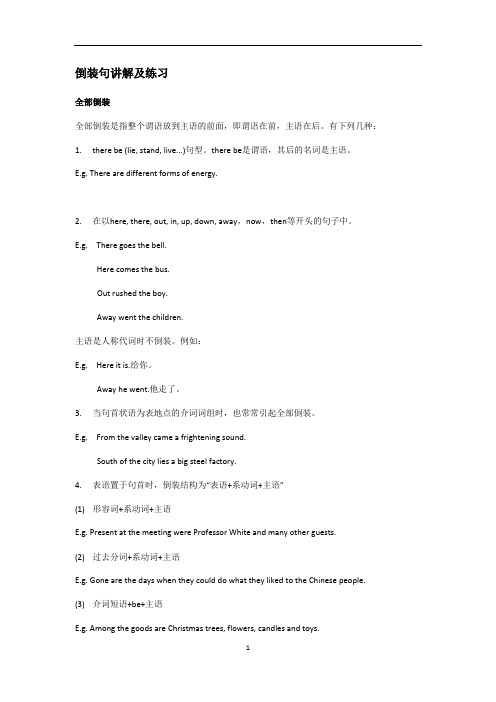
倒装句讲解及练习全部倒装全部倒装是指整个谓语放到主语的前面,即谓语在前,主语在后。
有下列几种:1.there be (lie, stand, live...)句型。
there be是谓语,其后的名词是主语。
E.g. There are different forms of energy.2.在以here, there, out, in, up, down, away,now,then等开头的句子中。
E.g. There goes the bell.Here comes the bus.Out rushed the boy.Away went the children.主语是人称代词时不倒装。
例如:E.g. Here it is.给你。
Away he went.他走了。
3.当句首状语为表地点的介词词组时,也常常引起全部倒装。
E.g. From the valley came a frightening sound.South of the city lies a big steel factory.4.表语置于句首时,倒装结构为“表语+系动词+主语”(1)形容词+系动词+主语E.g. Present at the meeting were Professor White and many other guests.(2)过去分词+系动词+主语E.g. Gone are the days when they could do what they liked to the Chinese people.(3)介词短语+be+主语E.g. Among the goods are Christmas trees, flowers, candles and toys.5.such置于句首时E.g. Such was Albert Einstein, a simple man and the 20th century’s greatest scientist.此句型中的such多被认为是表语,所以such后面的be动词应该与其后的“真正主语”保持一致。
高中英语倒装句讲解(附答案)
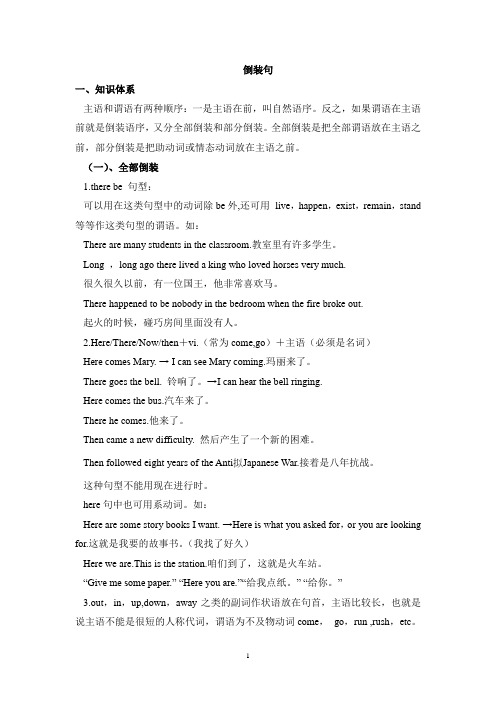
倒装句一、知识体系主语和谓语有两种顺序:一是主语在前,叫自然语序。
反之,如果谓语在主语前就是倒装语序,又分全部倒装和部分倒装。
全部倒装是把全部谓语放在主语之前,部分倒装是把助动词或情态动词放在主语之前。
(一)、全部倒装1.there be 句型:可以用在这类句型中的动词除be外,还可用live,happen,exist,remain,stand 等等作这类句型的谓语。
如:There are many students in the classroom.教室里有许多学生。
Long ,long ago there lived a king who loved horses very much.很久很久以前,有一位国王,他非常喜欢马。
There happened to be nobody in the bedroom when the fire broke out.起火的时候,碰巧房间里面没有人。
2.Here/There/Now/then+vi.(常为come,go)+主语(必须是名词)Here comes Mary. → I can see Mary coming.玛丽来了。
There goes the bell. 铃响了。
→I can hear the bell ringing.Here comes the bus.汽车来了。
There he comes.他来了。
Then came a new difficulty. 然后产生了一个新的困难。
Then followed eight years of the Anti Japanese War.接着是八年抗战。
这种句型不能用现在进行时。
here句中也可用系动词。
如:Here are some story books I wa nt. →Here is what you asked for,or you are looking for.这就是我要的故事书。
高中英语倒装句练习题30题含答案解析
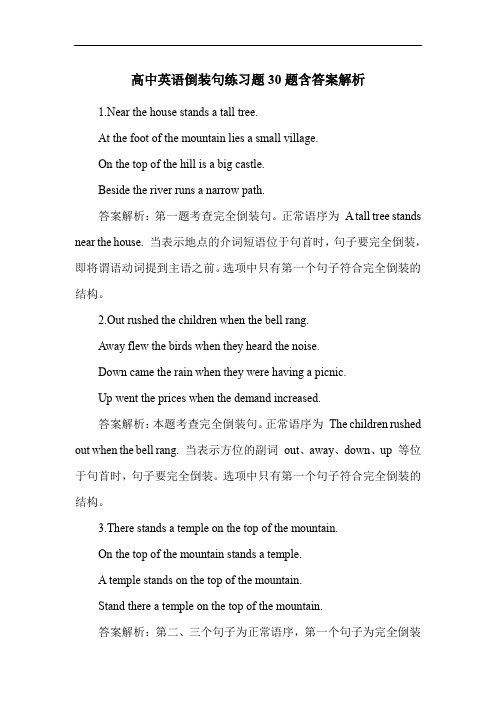
高中英语倒装句练习题30题含答案解析1.Near the house stands a tall tree.At the foot of the mountain lies a small village.On the top of the hill is a big castle.Beside the river runs a narrow path.答案解析:第一题考查完全倒装句。
正常语序为 A tall tree stands near the house. 当表示地点的介词短语位于句首时,句子要完全倒装,即将谓语动词提到主语之前。
选项中只有第一个句子符合完全倒装的结构。
2.Out rushed the children when the bell rang.Away flew the birds when they heard the noise.Down came the rain when they were having a picnic.Up went the prices when the demand increased.答案解析:本题考查完全倒装句。
正常语序为The children rushed out when the bell rang. 当表示方位的副词out、away、down、up 等位于句首时,句子要完全倒装。
选项中只有第一个句子符合完全倒装的结构。
3.There stands a temple on the top of the mountain.On the top of the mountain stands a temple.A temple stands on the top of the mountain.Stand there a temple on the top of the mountain.答案解析:第二、三个句子为正常语序,第一个句子为完全倒装句,将地点状语on the top of the mountain 置于句首,谓语动词stands 提到主语 a temple 之前。
高中英语倒装句(完整版详细讲义+随堂练习)

Grammar of the Inversion (Module 5 Unit 4)倒装句英语最基本的语序是主语在前, 谓语动词在后。
但有时由于句子结构的需要或表示强调, 就要采用倒装形式。
倒装分两种情况: 1)将谓语动词完全移到主语之前称为完全倒装, 2)只将助动词或情态动词放到主语之前称为部分倒装。
并且强调性倒装和以so, neither, nor开头的句子是高考例题的热点。
一、倒装句的意义1.用倒装构成疑问句,适应一定的语法结构的需要。
.in?Was the People's Liberation Army founded in 1927?2.为了强调某一部分, 而把这部分放到句首, 构成倒装。
t.fo.schoo.thi.term.So early did he come to school that no other students came.二、倒装的用法完全倒装1.在“ther.be”结构里, there是引导词, 主语在be后。
在“there + be”结构中的谓语动词有时不用be , 而用表示类似“存在”观念的其他不及物动词。
如: live, stand, come, lie, flow, enter, rise 和appear等。
e.g.Ther.i..bo.o.th.table.There came shouts for help from the river.There lies a large wheat field in front of the house.Many years ago there lived an old man in the wooden house.2.为了表达生动, 有时把表地点、方位的副词, 如here, there, now , then,, thus ,up, down, out, off, over, away, in等放在句首, 同时把谓语动词放在主语之前, 在here, there等副词开头的某些句子里(要用一般现在时态)。
高中英语倒装句详解及练习(附答案)
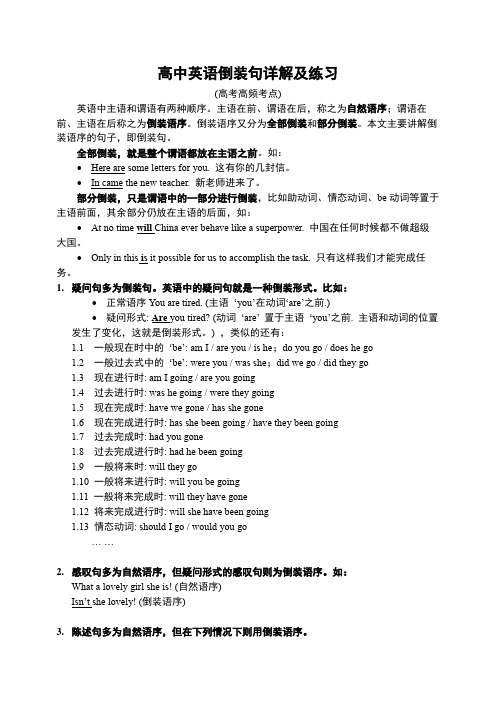
高中英语倒装句详解及练习(高考高频考点)英语中主语和谓语有两种顺序。
主语在前、谓语在后,称之为自然语序;谓语在前、主语在后称之为倒装语序。
倒装语序又分为全部倒装和部分倒装。
本文主要讲解倒装语序的句子,即倒装句。
全部倒装,就是整个谓语都放在主语之前。
如:•Here are some letters for you. 这有你的几封信。
•In came the new teacher. 新老师进来了。
部分倒装,只是谓语中的一部分进行倒装,比如助动词、情态动词、be动词等置于主语前面,其余部分仍放在主语的后面,如:•At no time will China ever behave like a superpower. 中国在任何时候都不做超级大国。
•Only in this is it possible for us to accomplish the task. 只有这样我们才能完成任务。
1.疑问句多为倒装句。
英语中的疑问句就是一种倒装形式。
比如:•正常语序You are tired. (主语‘you’在动词‘are’之前.)•疑问形式: Are you tired? (动词‘are’ 置于主语‘you’之前. 主语和动词的位置发生了变化,这就是倒装形式。
) ,类似的还有:1.1 一般现在时中的‘be’: am I / are you / is he;do you go / does he go1.2 一般过去式中的‘be’: were you / was she;did we go / did they go1.3 现在进行时: am I going / are you going1.4 过去进行时: was he going / were they going1.5 现在完成时: have we gone / has she gone1.6 现在完成进行时: has she been going / have they been going1.7 过去完成时: had you gone1.8 过去完成进行时: had he been going1.9 一般将来时: will they go1.10 一般将来进行时: will you be going1.11 一般将来完成时: will they have gone1.12 将来完成进行时: will she have been going1.13 情态动词: should I go / would you go… …2.感叹句多为自然语序,但疑问形式的感叹句则为倒装语序。
高中英语倒装句练习题及讲解

高中英语倒装句练习题及讲解1. 题目: Only after finishing his homework did he go to bed.讲解: 这个句子使用了“only + 状语”置于句首的倒装结构。
在这种情况下,主句的主语和助动词要发生倒装。
原句的正常语序是"He did not go to bed until he finished his homework."2. 题目: Not until the rain stopped did the children go outto play.讲解: 这里使用了"not until..."结构,当这个结构放在句首时,主句要使用部分倒装。
原句的正常语序是 "The children did not go out to play until the rain stopped."3. 题目: Never have I seen such a beautiful sunset.讲解: "Never"作为否定副词放在句首时,句子需要使用倒装结构。
原句的正常语序是 "I have never seen such a beautiful sunset."4. 题目: Under no circumstances will the company compromiseon quality.讲解: "Under no circumstances"是一个表示否定的短语,当它置于句首时,主句需要倒装。
原句的正常语序是 "The company willnot compromise on quality under any circumstances."5. 题目: So difficult was the problem that no one could solve it.讲解: "So + 形容词 + 主语 + 助动词"结构表示强调,需要使用倒装。
高中英语倒装句讲解与练习

高中英语倒装句讲解与练习高中英语倒装句讲解与练习倒装句讲解定义: 英语句子通常有两种语序:一种是陈述语序,一种是倒装语序。
将谓语的一部分或全部置于主语之前的语序叫做倒装语序。
分类:倒装可分为二种:将整个谓语提到主语之前的叫完全倒装(full inversion);而只将be 、情态动词或者助动词放在主语之前的叫做部分倒装(partial inversion)。
一、完全倒装1. There be结构。
另外,在此结构中可以用来代替be动词的动词有:exist, seem, happen, appear, live, rise, stand等。
如: There stood a dog before him.There exist different opinions on this question.巩固练习:1) ________ a beautiful palace ________ the foot of the hill.A. There stand; atB. There stands; underC. Stands there; underD. There stands; at2 (1).在以here、there、now、then等副词开头的句子里。
“Here, There, Now, Then + come (或be,go,lie,run) + 主语" 结构。
Here comes the old lady!Then came the hour we had been looking forward to.There comes the bus.Now comes your turn.如果主语是人称代词,就不用倒装。
如:Here you are.There she comes.(2). 表示方向的副词out, in, up, down等置于句首,要用全部倒装。
如果主语是人称代词,就不用倒装。
高中英语语法倒装句讲解及练习(附答案)
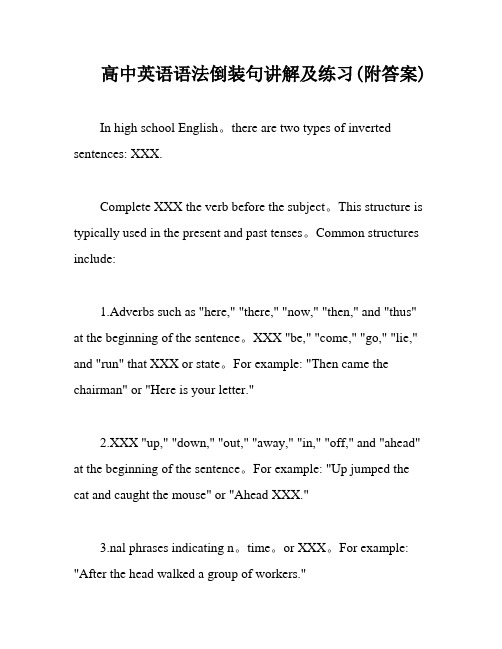
高中英语语法倒装句讲解及练习(附答案)In high school English。
there are two types of inverted sentences: XXX.Complete XXX the verb before the subject。
This structure is typically used in the present and past tenses。
Common structures include:1.Adverbs such as "here," "there," "now," "then," and "thus"at the beginning of the sentence。
XXX "be," "come," "go," "lie," and "run" that XXX or state。
For example: "Then came the chairman" or "Here is your letter."2.XXX "up," "down," "out," "away," "in," "off," and "ahead" at the beginning of the sentence。
For example: "Up jumped thecat and caught the mouse" or "Ahead XXX."3.nal phrases indicating n。
高考英语倒装句讲解及练习

倒装句Ⅰ.概念:倒装分为:完全倒装:整个谓语移至主语前面叫完全倒装。
部分倒装:只把助动词、系动词或情态动词放在主语之前叫部分倒装。
Exercise:全倒还是半倒?1. In the centre of the square stands a high monument.2. Never has our country been so strong as it is today.3. Here comes the bus.4. Not only did the teacher praise his students but also he gave them a big prize.5. Many years ago there lived an old man in the wooden house.6. Now comes your turn.7. Only in this way can you work it out.8. So excited did she look that she couldn’t say a word.完全倒装1.当副词here, there, out , in , up , down, away, off, now, then, over等位于句首,且主语是具体的名词时,主谓直接倒装;Our teacher came in. =In came our teacher.Your turn comes now. =Now ________________地点状语的介词短语放在句首。
under a big tree sat an old man3. 充当表语的介词短语、形容词、分词位于句首时,主谓直接倒装。
Christmas trees, flowers, candles and toys are among the goods.●Among the goods are Christmas trees, flowers, candles and toys.A boy who is 6 years old is lying on the floor.●Lying on the floor __________________________________Exercise :1. An interpreter was standing beside the table.=2. A group of young people are seated on the ground.=3. The time to part came then. =4. They climbed up, out of breath.=部分倒装:1.so, neither, nor 作部分倒装,表示" 也" 、" 也不"。
高二倒装句练习30题带答案解析

高二倒装句练习30题带答案解析1.Near the lake stands a tall tree.Under the tree is lying a dog.On the branch sits a bird.Beside the lake lies a stone.答案解析:第一句是完全倒装,正常语序是A tall tree stands near the lake. 第二句正常语序是A dog is lying under the tree. 第三句正常语序是A bird sits on the branch. 第四句正常语序是 A stone lies beside the lake.2.In the forest grow many beautiful flowers.Among the flowers fly several butterflies.Under the tree plays a group of children.Beside the river runs a small stream.答案解析:第一句正常语序是Many beautiful flowers grow in the forest. 第二句正常语序是Several butterflies fly among the flowers. 第三句正常语序是A group of children play under the tree. 第四句正常语序是 A small stream runs beside the river.3.On the wall hangs a beautiful painting.Below the painting stands a table.Above the table floats a balloon.Beside the table lies a book.答案解析:第一句正常语序是 A beautiful painting hangs on thewall. 第二句正常语序是A table stands below the painting. 第三句正常语序是A balloon floats above the table. 第四句正常语序是A book lies beside the table.4.At the entrance of the park stands a big statue.Behind the statue is a fountain.In front of the statue plays a band.Beside the statue lies a bench.答案解析:第一句正常语序是 A big statue stands at the entrance of the park. 第二句正常语序是A fountain is behind the statue. 第三句正常语序是 A band plays in front of the statue. 第四句正常语序是 A bench lies beside the statue.5.In the sky shines the sun.Under the sun fly some birds.On the clouds sit some angels.Beside the clouds floats a rainbow.答案解析:第一句正常语序是The sun shines in the sky. 第二句正常语序是Some birds fly under the sun. 第三句正常语序是Some angels sit on the clouds. 第四句正常语序是A rainbow floats beside the clouds.6.On the stage performs a famous singer.Under the stage are many fans.In the audience sits a critic.Beside the stage stands a microphone.答案解析:第一句正常语序是 A famous singer performs on the stage. 第二句正常语序是Many fans are under the stage. 第三句正常语序是A critic sits in the audience. 第四句正常语序是A microphone stands beside the stage.7.In the garden bloom many colorful flowers.Among the flowers dance some bees.Under the tree rests a cat.Beside the flowerbed stands a gardener.答案解析:第一句正常语序是Many colorful flowers bloom in the garden. 第二句正常语序是Some bees dance among the flowers. 第三句正常语序是 A cat rests under the tree. 第四句正常语序是 A gardener stands beside the flowerbed.8.On the mountain stands a ancient temple.Below the temple flows a river.In the temple prays a monk.Beside the temple lies a stone path.答案解析:第一句正常语序是 A ancient temple stands on the mountain. 第二句正常语序是A river flows below the temple. 第三句正常语序是 A monk prays in the temple. 第四句正常语序是 A stone path lies beside the temple.9.At the seaside stands a lighthouse.Beside the lighthouse sails a ship.On the beach play some children.Under the sun shines the sea.答案解析:第一句正常语序是 A lighthouse stands at the seaside. 第二句正常语序是A ship sails beside the lighthouse. 第三句正常语序是Some children play on the beach. 第四句正常语序是The sea shines under the sun.10.In the library sit many students.Among the books studies a girl.Under the table lies a book.Beside the bookshelf stands a librarian.答案解析:第一句正常语序是Many students sit in the library. 第二句正常语序是A girl studies among the books. 第三句正常语序是A book lies under the table. 第四句正常语序是A librarian stands beside the bookshelf.11.Never in my life ____ such a beautiful place.A.have I seenB.I have seenC.did I seeD.I saw答案解析:A。
倒装句的语法讲解+习题
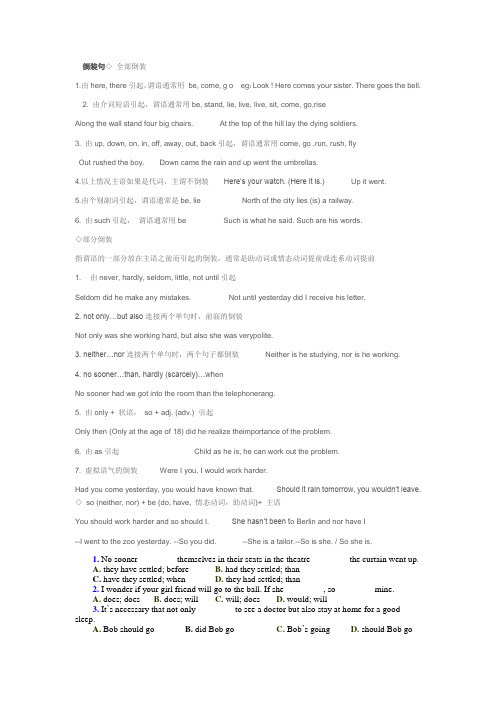
倒装句◇全部倒装1.由here, there引起,谓语通常用be, come, g o eg:Look ! Here comes your sister. There goes the bell.2. 由介词短语引起,谓语通常用be, stand, lie, live, live, sit, come, go,riseAlong the wall stand four big chairs. At the top of the hill lay the dying soldiers.3. 由up, down, on, in, off, away, out, back引起,谓语通常用come, go ,run, rush, flyOut rushed the boy. Down came the rain and up went the umbrellas.4.以上情况主语如果是代词,主谓不倒装Here’s your watch. (Here it is.)Up it went.5.由个别副词引起,谓语通常是be, lie North of the city lies (is) a railway.6. 由such引起,谓语通常用be Such is what he said. Such are his words.◇部分倒装指谓语的一部分放在主语之前而引起的倒装,通常是助动词或情态动词提前或连系动词提前1. 由never, hardly, seldom, little, not until引起Seldom did he make any mistakes. Not until yesterday did I receive his letter.2. not only…but also连接两个单句时,前面的倒装Not only was she working hard, but also she was verypolite.3. neither…nor连接两个单句时,两个句子都倒装Neither is he studying, nor is he working.4. no sooner…than, hardly (scarcely)…wh enNo sooner had we got into the room than the telephonerang.5. 由only + 状语,so + adj. (adv.) 引起Only then (Only at the age of 18) did he realize theimportance of the problem.6. 由as引起Child as he is, he can work out the problem.7. 虚拟语气的倒装Were I you, I would work harder.Had you come yesterday, you would have known that. Should it rain tomorrow, you wouldn’t leave.◇so (neither, nor) + be (do, have, 情态动词,助动词)+ 主语You should work harder and so should I. She hasn’t been t o Berlin and nor have I--I went to the zoo yesterday. --So you did. --She is a tailor.--So is she. / So she is.1. No sooner ________ themselves in their seats in the theatre ________ the curtain went up.A. they have settled; beforeB. had they settled; thanC. have they settled; whenD. they had settled; than2. I wonder if your girl friend will go to the ball. If she ________ , so ________ mine.A. does; doesB. does; willC. will; doesD. would; will3. It’s necessary that not only ________ to see a doctor but also stay at home for a good sleep.A. Bob should goB. did Bob goC. Bob’s goingD. should Bob go4. In ________ , but out ________ again.A. came the teacher; he wentB. came the teacher; went heC. did the teacher come; he wentD. the teacher came; went he5. It’s beyond description. Nowhere else in the world ________ such a quiet, beautiful place.A. can there beB. you can findC. there can beD. can find you6. Not until Dec. 2003 ________ caught by the US soldiers, and it was a great victory for the USA.A. was Saddam HusseinB. Saddam Hussein wasC. had Saddam Hussein beenD. Saddam Hussein had been7. Only after ________ his homework ________ to watch TV.A. he has finished; is he allowedB. has he finished; is he allowedC. he has finished; he is allowedD. has he finished; he is allowed8. Form then on we never saw her again, nor ________ from her.A. heard weB. had we heardC. we have heardD. did we hear9.“Never ____ to hurt your feeling while I was expressing myself in the discussion”explained Jim.A. I expectedB. expected IC. had I expectedD. did I expect10. ________ our bus; we’ll have to wait for the next.A. Does there goB. It goesC. There goesD. Does it go11.-It was careless of you to have left your new bike outside all night. -My god!________ .A. So did IB. So I didC. So was ID. So were you12. What a naughty boy he was! ________ .A. Down jumped he from the deskB. From the desk jumped he downC. He down jumped from the deskD. Down he jumped from the desk13. On the opposite wall ________ one map ________ dozens of pictures.A. hang; includingB. are hung; together withC. is hanged; withD. is hanging; as well as14. You can never use my computer. At no time ________ that machine.A. you should touchB. should you touchC. touch should youD. you touch15. Not until all the fish died in the river ________ how serious the pollution was.A. did the villagers realizeB. the villagers realizedC. the villagers did realizeD. didn’t the villagers realize【答案解析】1. B. 因为以否定词或半否定词开头的句子,要用部分倒装,排除A和D。
(完整版)高中英语语法倒装句讲解及练习(附答案)
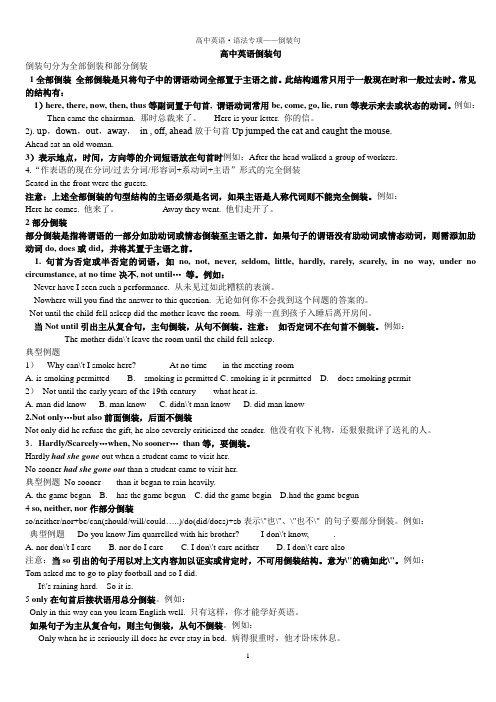
高中英语倒装句倒装句分为全部倒装和部分倒装1全部倒装全部倒装是只将句子中的谓语动词全部置于主语之前。
此结构通常只用于一般现在时和一般过去时。
常见的结构有:1)here, there, now, then, thus等副词置于句首, 谓语动词常用be, come, go, lie, run等表示来去或状态的动词。
例如:Then came the chairman. 那时总裁来了。
Here is your letter. 你的信。
2). up,down,out,away,in , off, ahead放于句首Up jumped the cat and caught the mouse.Ahead sat an old woman.3)表示地点,时间,方向等的介词短语放在句首时例如:After the head walked a group of workers.4.“作表语的现在分词/过去分词/形容词+系动词+主语”形式的完全倒装Seated in the front were the guests.注意:上述全部倒装的句型结构的主语必须是名词,如果主语是人称代词则不能完全倒装。
例如:Here he comes. 他来了。
Away they went. 他们走开了。
2部分倒装部分倒装是指将谓语的一部分如助动词或情态倒装至主语之前。
如果句子的谓语没有助动词或情态动词,则需添加助动词do, does或did,并将其置于主语之前。
1. 句首为否定或半否定的词语,如no, not, never, seldom, little, hardly, rarely, scarely, in no way, under no circumstance, at no time决不, not until…等。
例如:Never have I seen such a performance. 从未见过如此糟糕的表演。
Nowhere will you find the answer to this question. 无论如何你不会找到这个问题的答案的。
- 1、下载文档前请自行甄别文档内容的完整性,平台不提供额外的编辑、内容补充、找答案等附加服务。
- 2、"仅部分预览"的文档,不可在线预览部分如存在完整性等问题,可反馈申请退款(可完整预览的文档不适用该条件!)。
- 3、如文档侵犯您的权益,请联系客服反馈,我们会尽快为您处理(人工客服工作时间:9:00-18:30)。
倒装句一、定义:英语最基本的语序是主语在前,谓语动词在后。
但有时由于句子结构的需要或表示强调,就要采用倒装形式。
Eg:The bus comes here.Here comes the bus.车来了。
二、分类:全倒装:将谓语动词完全移到主语之前称为完全倒装,半倒装:只将助动词或情态动词放到主语之前称为部分倒装。
Eg:Many years ago there lived an old man in the wooden house.很多年前有一位老人住在那间木屋里。
Never have I been late for school this term.这学期,我从来没上学迟到过。
三、全倒装:“五全”=有时表地方经常与be/come/exist/fall/follow/go/remain/seem/stand(表示移动或动态的不及物动词连用)或用表示类似“存在”观念的其他不及物动词如:live, stand, come, lie, flow, enter, rise 和appear等㈠、“有”:在“there be”结构里Eg:There is a box on the table.桌子上面有一个盒子。
✧㈡、“时”:表示时间副词,如:now,then,Eg:Now comes your turn.现在轮到你了。
✧㈢、“表”:表语放句子前,“表语+系动词+主语”的结构Eg:Present at the party were Mr. Green and many other guests.格林先生和其他的客人在这个聚会上。
Seated on the ground are a group of young men.一群年轻人坐在了地上。
✧㈣、“地”:地点状语放在句首Eg:In south of the river lies a small factory.小工厂位于河的南方。
From the valley came a cry.山谷传来一阵哭声。
✧㈤、“方”:表方位的副词here, there 或out, in, up, down, away, off等标志词放在句首Eg:There lies a large wheat field in front of the house.房子前面有一大片麦田。
Off all the lights went when I came in.当我进来时,所有的灯都灭了。
四、半倒装:“八部”=不只让步也常需(虚)如此祝福✧㈠、“不”表示否定☺①、no, not, never, hardly, no,not,never,hardly,barely,seldom,rarely,scarcely,no longer,nowhere Eg:Never have I been to Beijing.我从没有没有去过北京。
☺②、绝不:at n time, in no way, by no means, on no account, in no case, in/under no circumstance Eg:At no time can we give up.我们决不能放弃。
☺③、Not until ...:直到Eg:Not until my mother came home did I go to bed.知道我妈妈回家我才睡觉。
☺④、Hardly/ Scarcely...(过完)...when...(一过)...:一...就...No sooner...(过完)...than...(一过)...:一...就...Eg:He had hardly got home when it happened to rain.=Had he hardly got home when it happened to rain.他一到家碰巧就下雨了。
☺⑤、Not only......but also......:(前倒后不倒)Eg:Not only did he refuse the gift, he also severely criticized the sender.他没有收下礼物,还狠狠批评了送礼的人㈡、“只”:only所修饰的副词、介词短语或状语从句放在句子开头时。
Eg: Only then did I realize that I was wrong.只有到那时我才意识到我错了。
Only in this way can you learn from your mistake.只有用这样的方法你可以从错误中学习。
Only when the war was over in 1918 was he able to get happily back to work.只有当战争于1918年结束时候,他才能够快乐地回到工作当中。
※当only 之后所接的不是状语时不可以用倒装Eg:Only Comrade Zhang knows about the matter..只有张同志知道这件事。
✧㈢、“让步”:as/though/although引导让步状语从句时要倒装(形/副/名/动+as +主语 + 谓语)Eg:Proud as they are,they are afraid to see me.尽管他们自豪,但是他们还怕见到我。
Child as he is,he seems to know everything.(child前不加冠词)尽管他是个孩子,但他好像知道一切。
Hard as he worded,he made little progress.尽管他努力工作,但是几乎没什么进步。
※以上句中as可以替换though/although,但是as更加常用。
✧㈣、“也”:so/nor/neither开头,表示谓语所述的情况也适用于另一个人或一事物的肯定或否定句so用于肯定句,表示“也一样”“也这样”;nor/neither用于否定句,表示“同样也不,也不这样”。
Eg:I am watching TV. So is she.我正在看电视,她也在看。
My parents didn't watch TV last night. Neither (Nor)did I.我父母昨晚没有看电视,我也没有看。
※表示两人的同样一个情况时,只能表示一件事,即上、下句所使用的动词、时态要一致。
✧㈤、“常”:表示频度副词如:often、many a time, now and again等经常用于正式的文体中Eg:Often did he advise them not to smoke.他经常建议他们不要抽烟。
✧㈥、“需=虚拟”:省略if的虚拟条件句,把助动词were、had、should提到主语前面时Eg:Had it not been for your help, we shouldn't have achieved so much.要不是你的帮助,我们不可能收获这么多。
✧㈦、“如此”: so/such …that…。
从句中,当so+形容词/副词或such+名词位于句首时。
Eg:So exhausted was she that she wanted to have a rest.他是如此地疲惫以至于想要休息一下。
✧㈧、“祝福”:当may放在句首,表达祝愿时。
Eg:May you succeed!祝你成功!五、练习题Part One 单项选择1._______ and caught the mouse.A. Up the cat jumpedB. The cat up jumpedC. Up jumped the catD. Jumped up the cat2.______ and the lesson began.A. In came Mr BrownB. Mr Brown in cameC. In came heD. came in Mr Brown3. Over _______ , dead.A. rolling the goatB. rolled the goatC. did the goat rollD. the goat rolled4.— Where is my shirt, mum? —_________.A. There is itB. There it isC. There isD. Here is it5. — Where is your father? —Oh, ________.A. here he comesB. he here comesC. here does he comeD. here comes he6.The door opened and there ________ .A. enters an old manB. entered an old manC. did an old man enterD. an old man entered7. Now ______ your turn to recite the text.A. will comeB. comesC. has comeD. there is8. Often _____ them not to smoke here.A. we advisedB. advised meC. did we adviseD. had we advised9. ________ playing soldiers.A. Inside the room were two boysB. Inside the room two boysC. Were two boys inside the roomD. Inside the room was two boys10. On the wall _______ two large portraits.A. are hanging B .Hanged C. hang D. hangs11. _______ who was wounded in the stomach.A. Among them were a soldierB. Among them was a soldierC. Among them a soldier wasD. Among they was a soldier12. Next door to ours ________ , who is no less than eighty.A. that lives an old manB. does an old man liveC. lives an old manD. where lives an old man13.She plays the piano very well, ______.A. so every one of us doesB. every one of us doesC. so does every one of usD. so do every one of us14.You say he works hard, ______, and _____.A. so he does; so you doB. so he does; so do youC. so does he; so do youD. so does he; so you do15. —I thought you women were present at the meeting. —__________.A. So we wereB. So we didC. So were weD. So did we16.I don’t think Jack will come today, _____.A. nor will MaryB. and Mary doesn’tC. Mary will eitherD. or Mary does17. She is fond of cooking, _____I .A. so amB. nor amC. neither doD. nor do18.Marx was born in Germany and German was his native language.A. So it was with EnglesB. So was it with EnglesC. So was EnglesD. So did Engles19.A fish needs water and without water it will die._______.A. So does a manB. So will a manC. So it is with a manD. So is it with a man20. So absorbed _______ the work that she often forgot to _____ her meals.A. had she been in; doB. she was in; makeC. was she in; takeD. she had been in ; have21.So loudly ______ that every one of the class could hear him.A. did he speakB. did he spokeC. spoke heD. he spoke22. __________ his appearance that no one could recognize him.A. Strange so wasB. So strange wasC. Was so strangeD. So was strange23.Not once ______ their plan.A. did they changeB. they changedC. changed theyD. they did change24. Never ______ such a wonderful place as Hangzhou.A. are seeingB. had I seenC. I have seenD. have I seen25.Seldom ______ TV during the day.A. they watchB. are they watchingC. have they watchedD. do they watch26.Nowhere ______ as in my garden.A. the flowers were so beautifulB. were the flowers so beautifulC. so beautiful were the flowersD. so beautiful the flowers were27. Hardly ________ his homework when he went out.A. finished heB. he had finishedC. did he finishD. had he finished28.Scarcely _____ finished their homework ______ I came into the classroom.A. had they; thanB. they had; whenC. had they; whenD. did they; when29. Not only _______ a promise, but also he kept it.A. has he madeB. does he makeC. he madeD. did he make30. Not until his comrades criticized him _______ to admit his mistake.A. had he begunB. began heC. did he beginD. does he beginPart Two 翻译下列句子。
